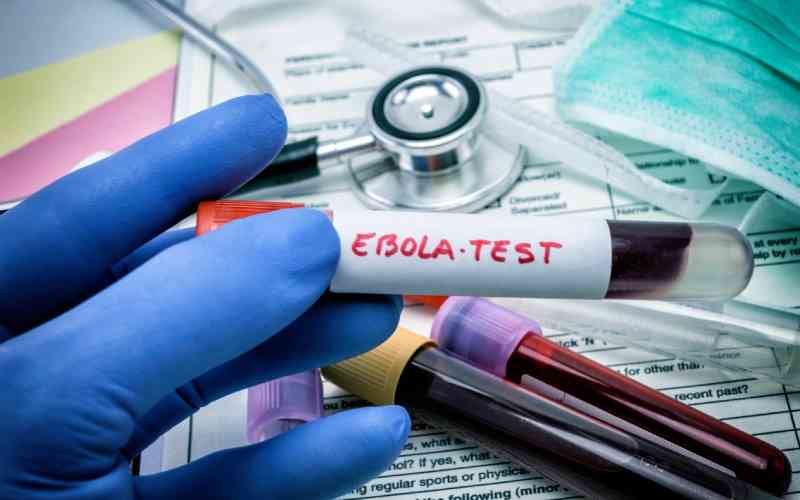
The highly contagious Ebola virus has claimed more than 15,000 lives since it was first identified in central Africa in 1976.
More than three-quarters of those deaths occurred during a brutal outbreak in West Africa which began a decade ago, beginning in Guinea before spreading to Liberia and Sierra Leone.
As Friday marks 10 years since the first Ebola cases were reported in Sierra Leone on May 24, 2014, here is a factfile on one of the world's most deadly diseases:
Origins
Ebola is a viral haemorrhagic fever that was first discovered in the Democratic Republic of Congo (DRC).
Six of the virus species are known to cause disease in humans -- Zaire, Sudan, Bundibugyo, Reston, Tai Forest and Bombali.
The first three have resulted in serious outbreaks in Africa, but Zaire has caused the vast majority of cases over the last decade.
Transmission
- From Monkey pox, Covid-19 and Nipah virus: Why animal-to-human diseases are on the rise
Keep Reading
The virus' natural reservoir animal is suspected to be a species of fruit bat, which does not itself fall ill but can pass the disease on to primates, including humans. Humans become exposed to the virus if they kill or butcher infected bats for food.
Among humans, the virus is passed on by contact with the blood, body fluids, secretions or organs of an infected or recently deceased person.
Those infected do not become contagious until symptoms appear. They become more and more contagious until just after their death, which poses great risks during funerals.
Death rates are high, at around 50 percent on average of those infected, and up to 90 percent for some epidemics, World Health Organization (WHO) data show.
According to a 2021 study, the virus can lie dormant in the bodies of survivors for years before waking up and triggering a new outbreak.
Symptoms
Following an incubation period of between two and 21 days, Ebola develops into a high fever, weakness, intense muscle and joint pain, headaches and a sore throat.
The initial symptoms are often followed by vomiting and diarrhoea, skin eruptions, kidney and liver failure, and sometimes internal and external bleeding.
People who survive the virus can suffer from arthritis as well as vision and hearing problems.
Vaccines and treatment
Two vaccines -- Merck's Ervebo and Johnson & Johnson's two-dose Zabdeno -- have been approved for use against the Zaire Ebola strain.
DRC health authorities have said vaccines helped slow the spread of the virus during a 2021 outbreak.
A study published in The Lancet Infectious Diseases in February found that the Ervebo vaccine halved the risk of dying from Ebola -- even if it was administered just days before symptoms appear.
In terms of treatment, the WHO in 2022 recommended two life-saving medicines, Inmazeb and Ebanga, for the Zaire strain.
There are currently no approved treatments or vaccines for the Sudan strain.
However, after a Sudan Ebola virus outbreak emerged in Uganda in 2022, three vaccine candidates were quickly developed and trialled in the East African country.
Worst outbreaks
The worst-ever outbreak began in December 2013 in southern Guinea before spreading to two neighbouring West African countries, Liberia and Sierra Leone.
More than 11,300 people were killed, according to WHO estimates.
The second deadliest took place between 2018 and 2020 in DRC's conflict-plagued North Kivu province and claimed the lives of nearly 2,300 people.
DRC has experienced more than a dozen Ebola outbreaks since the 1970s. Its most recent was from April to July 2022, killing five.
In January, Uganda declared the most recent Ebola epidemic over after it claimed the lives of 55 people.
 The Standard Group Plc is a multi-media organization with investments in media
platforms spanning newspaper print
operations, television, radio broadcasting, digital and online services. The
Standard Group is recognized as a
leading multi-media house in Kenya with a key influence in matters of national
and international interest.
The Standard Group Plc is a multi-media organization with investments in media
platforms spanning newspaper print
operations, television, radio broadcasting, digital and online services. The
Standard Group is recognized as a
leading multi-media house in Kenya with a key influence in matters of national
and international interest.











